My last visit to Daghestan was in 1995, after which the neighbouring Chechen situation became more of a threat to Daghestan and I was told by my local friends that the authorities genuinely felt that ‘they were unable to guarantee my security’. This phrase is usually a euphemism for a refusal. Perhaps both applied to me.
In the intervening period two of my important official supporters had died: Rasul Gamzatov the national poet and a former member of the Supreme Soviet, in 2003, and his wife Patimat Saidova director of her fine art museum, in 2000; and Ramazan Khappoulaev director of the Kraevecheskii state museum under the ministry of culture, also in 2003. Other friends in the administration had retired, so it fell to my 21-year long academic collaborator Magomedkhan Magomedkhanov to try to get me a visa, which was well outside his previous experience.
Relations between UK and Russia had been in sharp decline with the UK ambassador hounded by Putin’s brown-shirted (Nashi) youthful thugs, in response to his mild speech about environmental damage in Russia at the G8 conference in June 2006. President Putin enriched by the rising prices of Russia’s oil and gas exports has gained in assertive confidence which had resulted in a series of clumsy international actions which avoided the niceties of diplomacy. Then former KGB officer Aleksandr Litvinenko, who had just gained UK citizenship as a refugee, was murdered in London in November 2006 by slow poisoning from radioactive polonium which is only produced by Chernobyl type reactors in Russia, and because of delivery problems is unlikely to be available commercially. It left traces everywhere. In particular there were traces on airplanes which had flown another KGB officer Andrei Lugovoi who had met him back to Russia. Attempts by UK police to interview Lugovoi in Moscow were refused.
The Russian government also attempted to link any help with the extradition from UK of two well-known refugees: Boris Berezovsky formerly the Russian media tycoon, known as an oligarch who continues to oppose Putin (another former KGB officer); and the senior Chechen rebel international spokesman Ahmed Zakhaev. In mid-winter of 2006 Russia cut Ukraine’s gas supply which in turn affected its transit pipeline supplies to Europe, a warning of what surely will happen in future. Russia also abrogated from the 1987 arms limitation treaty and was now moving troops into recently restricted border areas. Furthermore, in response to what Russia states is a threat of US and NATO proposals to site rocket-early-warning bases in Czech Republic and Poland, Russian TU-54 bombers have been over-flying North Sea British and Norwegian off shore oil fields. In addition, the chief Russian admiral demanded access by Russian warships to the Mediterranean. Russia was gradually returning to its sphere of influence Former Soviet States which gained independence in 1991. The usual method was for Russia to use its oil and gas hegemony and other trade relations to impose an economic dominance in concert with, or followed by, continuation of Soviet period military bases.
Against this background it should not have surprised me that my visa took 40 days of uncertainty to appear, which a staffer from Aeroflot in London where I bought my ticket said was now the norm. Also UK applicants had to pay double other EC citizens were charged for their visas. A same-day visa cost me £95. On the other hand I was personally treated well and was not obliged to queue outside. I had given the cultural attaché a copy of our book Tattooed Mountain Women and Spoon Boxes of Daghestan and did my business in Russian. Just when I thought that all was well, they told me that the rules had changed and in addition to my invitation from either the Academy of Sciences or Magomedkhan’s carpet-weaving business, I needed an invitation from OVIR, which is the public face of the FSB secret police. OVIR controls registration (propiska) which continues although it is illegal according to the new Russian Constitution. I needed a one-page form signed by the single authorized officer in Makhachkala in Daghestan. He had to authorize it and the application was then sent to Moscow, where it was eventually agreed and then sent back to Makhachkala for reauthorisation.
On previous visits I was always met in Moscow and taken to the next airport or put up for the night. Times had changed and I was now on my own. The flight arrived at Shermetievo airport north of Moscow about 6 in the morning. I was determined to use public transport to find out if it worked. There is no train shuttle or inter-airport bus, so I waited for an hour in the warm morning sunshine for a crowded local bus which took me standing to the end of the Moscow Metro. There I joined the rush hour to go to Paveletskaya on the inner circle. There, after a 15-minute walk to another overland part of the station I caught the wide-gauge new express train to Domodedovo the internal airport in south of Moscow. This has recently been impressively rebuilt to European standards. It is indeed a pleasant airy place with many facilities. Although I was unable to buy the connecting ticket from Sibir-7, also doubling with Daghestan Airways, at the Aeroflot office in Piccadilly in London, Magomedkhan bought it for me with my credit card number. When I reached Domodedovo, it was a rapid task to present my email confirmation in exchange for a valid ticket. Moscow-Daghestan return cost about $US 280. For unexplained reasons we got an old Tupolev 154M plane from Daghestan Airways where the seats lurched back when you sat in them and then a bar in the seat stuck into you when you tried to sit up. They dispensed with the statutory safety drill presumably in tacit acknowledgement that any accident would be fatal. The same day as my return ten days later, there was a report of a similar Daghestan Airlines plane engine bursting into flames on the runway in Domodedovo at 4am. Happily, no one was killed or seriously injured and the plane duly flew off at 6.50am.
I liked the brightly-coloured emblem on the airplane’s tail with a sun-bird or simurgh, wings flapping against a golden disc, presumably the sun, over the green-blue-red stripes of Daghestan’s flag in a designer’s pretence of independence from Russia. Since 1992 the Russian-Chechen wars closed virtually all of Daghestan’s trading routes with its largest customer, Russia. Until the Daghestani economic boom began around 2004, it was very difficult to start up a business in Daghestan, with as much as a year’s turnover required as a deposit up front, as decided by the authorities. There was a baffling array of taxes and extortions by officials. The economy was stagnant and the result was and continues to be that Russia subsidizes over an estimated 80% of the Daghestan State expenditure.
At the nearly deserted Makhachkala airport, which had not been modernized, there was the same creaking carousel and long wait for my luggage. I was met by Magomedkhan who had been brought by Gussein in his new VW saloon car.
We wanted to see the difference not only within Makhachkala so we needed transport. It took a couple of hours and help from Magomedkhan’s son-in-law to find Abakar, an ex-army officer aged about 30, whom I hired as driver for $80 a day (£36) plus petrol, which cost a third of UK prices. He had a lot of experience in war zones, so he was suitably cautious on the new asphalt and the old dirt roads.
The first things I noticed driving back from the airport was the new dual carriageway and the endless vista of new two and three-storey stone-built houses. The population of Makhachkala had increased from about 350,000 to 500,000. This is partly because of more migration from mountain villages; partly because with the house-building allowed there was more room, and partly because in Daghestan the birth rate is high at over 20% population increase over a decade. There is plenty of food with relatively far more choice, but correspondingly more expensive than 12 years ago. There were more rich people as well as I strikingly saw when we visited Academician Gadji Gamzatov’s house in Kaspisk. Even with a third storey which he had built onto his house, which used to stand in splendid isolation, it was now somewhat dwarfed and quite surrounded by a large estate of palaces by the sea with its private beach and restaurant where we had a leisurely shaded lunch to the lapping of blue water and squeals of children bathing. They had so many hard and punishing years that I could only feel happy for them, that they had found some contentment and leisure. It is still reported that Daghestan alongside Ingushetia is the poorest republic in Russian Federation.
In contrast, it’s more tense financially in Magomedkhan’s home. His wife Raziat, a trained economist who works as the chief bookkeeper accountant for the Academy of Sciences, carries on after work until midnight to 3am, and at weekends, to make pasta and sweet cakes and pastries for sale in their apartment. This is needed to supplement their incomes with Magomedkhan’s stipend as a senior academy of sciences researcher with a small surplus from his carpet weaving enterprise. His finances were dangerously in disarray after his daughter’s wedding that came to over $10,000; his nephew required a payment of $12,000 to get into police college, having passed all the exams; and his sister needed over $5000 of medical treatment in Moscow to halt a cancerous growth behind her nose, near her optic nerve. In spite of all other dramatic changes there is still no affordable health insurance or consumer banking with credit cards and overdraft facilities. In 1995 average wages in Daghestan were a quarter of those in Moscow. In December 2002 CJES (campaign/ committee for journalists in extreme situations) reported that journalists in Daghestan were paid an average of 2000 to 2500 r ($625 to $780: @ 32r =$1) per month. Energy in Daghestan is mainly provided by hydro-electricity, for example from the new dam beneath Gunib. This also draws attention to the widespread neglect of pollution with the water near the dam entirely covered in discarded plastic bottles, and the scars of dumped garbage on steep mountain slopes in villages.
Everywhere we went there were new houses – Archi mountain village and hamlets at over 2000 metres; Levashi, the lowland centre of cabbages grown for the Siberian market and connected to Makhachkala by a new highway cutting through the mountains that saves 1 ½ hours over the old drive via Buinakst; Gapshima village, where as plant-hunters we picked cat’s pears the purple tattoo dye plant which grows in the cemetery; Gunib Avar, former stronghold of Shamil; Dargi towns: Tashpinar; Khajalmaki; and Akusha; Kumukh the Laki capital; Karakh village of Tabassarani weavers. We found nowhere without new buildings. Reporters and others told us that Makhachkala was the most rapidly developing city in the Russian Federation after Moscow. The strangest development was in the village of Shukti near Gapshima. A close associate of President Gorbachev Mr Magomed Chartayev was the former chief of the Sovkhoz state farm there, and built the locals a new village as a philanthropic act. It was true communism appearing during capitalism. During 1993-1996 he knocked down all the small old one-storey houses and replaced them with all different three-storey carved limestone stone houses. Each family was given a house according to the number of children and the ground floor was provided ready furnished. He died seven years ago and his smaller than average house is dwarfed by his son’s unfinished house with rusting scaffolding. The bank is now coverted into apartments. The whole village infrastrucure was never completed and his name does not even appear on the peeling Soviet sign at the entrance to the village. It has the only unfinished mosque in Daghestan. The portrait of Stalin that remains on the war memorial is colourfully painted and the old Communist administration centre stands with its front door effectively blocked by the Soviet neo-classical portico with its very odd three columns.
Daghestan is now the southern Russian border state with Azerbaijan. The main coastal road had been re-asphalted removing all potholes and random slopes that I remembered and feared from before. There are three main Russian military bases; firstly near the border with Azerbaijan; near Kizliar/ Khasavyurt; and a new base near Botlikh on the mountain road to Vedeno centre of Chechen rebels, with a new highway under construction from the highway to Botlikh, which will cut driving time by hours. In Makhachkala the dangerous driving is reminiscent of Turkey 20 years earlier before Draconian laws were introduced to calm down motorists. The number of cars has increased so that there are now frequent traffic jams in Makhachkala. There are large numbers of newly built petrol stations where I only remember the unavailability of petrol where it was sold in large glass vessels called ballon. The main traffic junction in Makhachkala was crowned by three or four large advertisement hoardings. Most noticeable was one for Harry Potter, celebrating the book launch on 7 July 2007 of “HP and the Deathly Hallows”.
The other more vivid form of communication is mobile phones. Even Magomedkhan’s mother Mayserat, who is a mountain woman of about 70 has her mobile hidden in the folds of her traditional costume. Did she visit neighbours less as she could now ring them? No, of course not. The phone was for talking to more distant people. There is email too in the larger cities.
Then there were everywhere wonderful strings of corner shops, selling for example a hundred varieties of beer. There are several wines from Daghestan too, as Armenia, Georgia and Azerbaijan are now independent from Russia. When Putin met the Queen in June 2003, in a formal exchange of gifts, she gave him a bottle of Scotch whisky, perhaps to remind him of how Britain has given Scotland some autonomy, and he gave her the best cognac from Daghestan. The many pharmacies were full of generic medicines far cheaper than UK, but still expensive by local standards. The women in the street looked striking taking advantage of the flood of cosmetics now available. There are a few supermarkets and private markets specialising in expensive delicatessen and imported foods, and at the same time the state market ‘number two’ is still vibrant and crowded. The restaurants had improved beyond recognition in Makhachkala but not for example in regional towns like Kumukh. “Briz” night club in Kaspisk was very modern and loud, with customers aged from 6 to 90. The teenage girls and boys followed tradition and danced separately in single-sex groups in circles of ten to twenty.
It appeared that I had become a sort of institution being the foreign link with many famous Daghestanis. Academician, Gadji Gamzatov, was delighted to see me. He told friends that I was his friend abroad and mutual complements flowed. The media was wheeled in. The state controlled main newspaper Novye Delo published a long interview of me with a photo, hooked on to the nomination of Magomedkhan and my book Tattooed Mountain Women and Spoon Boxes of Daghestan, which was voted second oddest title in the world 2006 by the Bookseller Magazine. It was almost an obituary. There was also a long Daghestan TV interview around my collaboration with Magomedkhan of over 21 years, being the longest between a Caucasian and a foreigner, except perhaps for Stalin and Derzhinski – our joke. Dagestan will become even better known next year with two TV films which I helped set up: Mentorn’s David Dimbleby recreating Lermontov’s journey with Magomedkhan explaining the Caucasus; and Discovery Channel’s Seven remarkable people from Russian Federation with Magomedkhan and his natural dyed carpet production enterprise representing the Russian Caucasus.
Chechnya remained the elephant in the living room. Ever since the repulsed invasion of 1998 there had been an additional tension in Daghestan. In the whole world where there is Islamist terrorism, Daghestan is virtually the only country which has almost eliminated the Wahabi/Taliban/Al-Qaida threat. It is because Daghestan is made up of psychologically strong moderate Naqshabandi Sufis who can stand up to the Islamists far better than the ‘moderate’ Islamic ‘communities’ in other countries, which lack leadership and a focussed voice. This is backed up by massive Russian forces. There are frequent road blocks in place, even if not always operative. On a local Constitution Day on 26 July the authorities had organised a rock concert in Revolution Square, still presided over by a statue of Lenin. The OMON special police militia had been flown in and bussed in from Volgograd, and in Makhachkala every car was stopped and searched. It didn’t make the news, and I was told that it was a common occurrence. Our ex-officer driver passed through quickly, mainly eliciting a request for where he had obtained his sun-shaded windscreen from. Any attack on the televised rock concert was avoided. However soon after on July 27 the moderate deputy mufti Magomed Albogachiyev and his driver were killed by an explosion in Makhachkala. Magomedkhan said that he was a popular man with many friends. By August 3 five militants had been killed and three arrested in separate operations in Makhachkala and Sergokala, a local police spokesman said. There is an apparent contradiction where women can walk alone in the dark streets at night, but officials are targeted by extremists who wish to destabilise the region. We visited OVIR to register my arrival and we were treated politely and relatively quickly, even though we were sent outside to make some photocopies. It is not usually so simple for the locals. Magomedkhan a trained sociologist-ethnographer had also gained experience in this process during the past two months of delays.
Daghestan’s prosperity is relative to its poverty a decade ago, but it is still one of the poorest places in Russian Federation. Its current prosperity is a sort of delayed and seemingly reluctant reward from Putin for not supporting the Chechens when they invaded in 1998, and in general submitting and cooperating with Russian rule. The boom only began in 2003. On 15 July 2005 Putin had briefly visited Derbent, the oldest inhabited city in the Caucasus and Russia – the first Russian or Soviet leader to visit Daghestan in living memory. He also pledged half a billion dollars to be spent on strengthening the southern border with Azerbaijan, a perceived gateway for arms and drugs trafficking, money laundering and terrorist infiltration.
I was told that in 2007 the complicated business regulations, which were in consequence open to official extortion, were being simplified. In particular it would be simpler to register a new business without paying a year’s projected sales as an advance tax; and one overall tax would be charged instead of several. If it happened, in concert with air and rail routes being reopened in Chechnya and an increase in ease of travel in the region, prospects looked to improve.
Author – Robert Chenciner

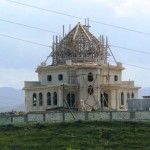
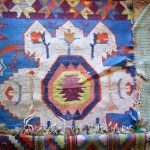
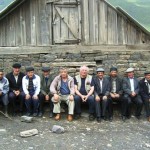
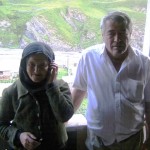
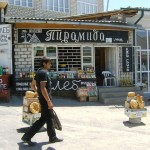
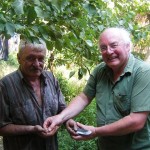
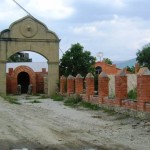
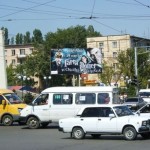
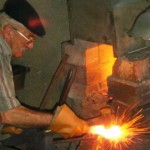
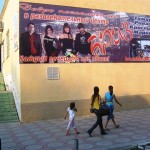
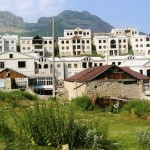
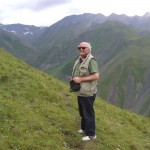
1 comment for “Daghestan – Return To The Caucasus”